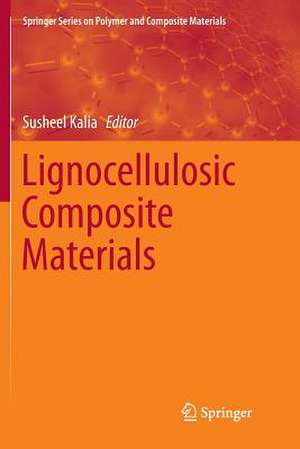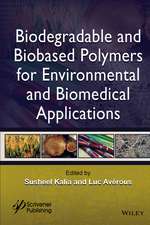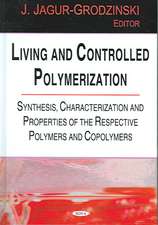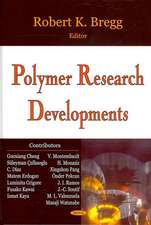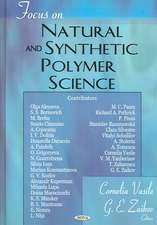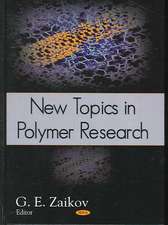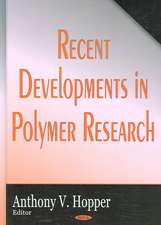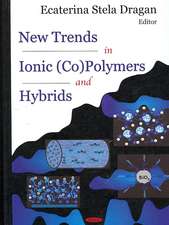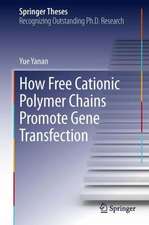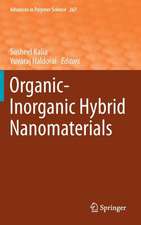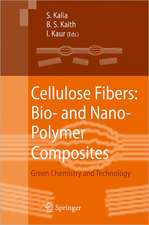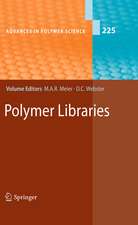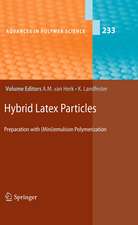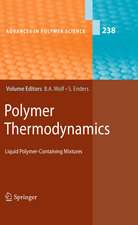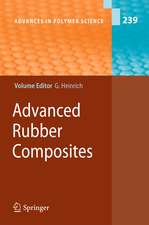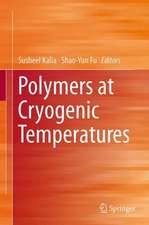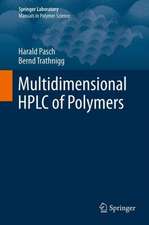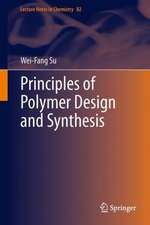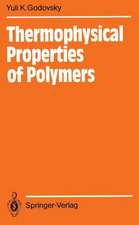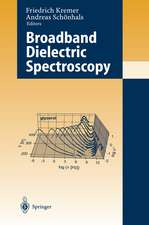Lignocellulosic Composite Materials: Springer Series on Polymer and Composite Materials
Editat de Susheel Kaliaen Limba Engleză Paperback – 6 iun 2019
This book comprehensively summarizes important aspects of research in the active field of lignocellulosic (polymer) composites, including polymer materials from or containing cellulose, hemicellulose and lignin. It describes how these materials can be produced from forest products and natural fibers from sources such as jute, flax, sisal, and many more, and even from agricultural residues (like wheat straw, corn stover, or sugarcane bagasse). In times of high demand for renewable green materials, lignocellulosic materials from organic matter produced by trees, shrubs and agricultural crops present a highly attractive feedstock.
The international authors explain different treatment and fabrication methods for the production of lignocellulosic materials. Other chapters address the properties of these green materials or illustrate specific applications, ranging from food packaging and household products to adsorbents and even conductive polymer composites. In thisway, this book offers a broad and comprehensive overview over the entire field of lignocellulosic composite materials.
| Toate formatele și edițiile | Preț | Express |
|---|---|---|
| Paperback (1) | 1224.36 lei 6-8 săpt. | |
| Springer International Publishing – 6 iun 2019 | 1224.36 lei 6-8 săpt. | |
| Hardback (1) | 1230.53 lei 6-8 săpt. | |
| Springer International Publishing – 19 ian 2018 | 1230.53 lei 6-8 săpt. |
Din seria Springer Series on Polymer and Composite Materials
- 18%
 Preț: 1106.00 lei
Preț: 1106.00 lei - 18%
 Preț: 1228.47 lei
Preț: 1228.47 lei - 18%
 Preț: 1108.51 lei
Preț: 1108.51 lei - 15%
 Preț: 653.00 lei
Preț: 653.00 lei - 15%
 Preț: 641.85 lei
Preț: 641.85 lei - 18%
 Preț: 1105.50 lei
Preț: 1105.50 lei -
 Preț: 389.49 lei
Preț: 389.49 lei - 15%
 Preț: 641.53 lei
Preț: 641.53 lei - 18%
 Preț: 1230.53 lei
Preț: 1230.53 lei - 15%
 Preț: 644.18 lei
Preț: 644.18 lei - 18%
 Preț: 995.53 lei
Preț: 995.53 lei - 18%
 Preț: 956.18 lei
Preț: 956.18 lei - 18%
 Preț: 952.89 lei
Preț: 952.89 lei - 18%
 Preț: 953.82 lei
Preț: 953.82 lei - 15%
 Preț: 638.72 lei
Preț: 638.72 lei - 18%
 Preț: 1013.50 lei
Preț: 1013.50 lei - 15%
 Preț: 643.84 lei
Preț: 643.84 lei - 15%
 Preț: 651.67 lei
Preț: 651.67 lei - 15%
 Preț: 660.18 lei
Preț: 660.18 lei - 18%
 Preț: 1671.39 lei
Preț: 1671.39 lei - 15%
 Preț: 644.49 lei
Preț: 644.49 lei - 15%
 Preț: 635.80 lei
Preț: 635.80 lei - 18%
 Preț: 1127.78 lei
Preț: 1127.78 lei - 18%
 Preț: 887.51 lei
Preț: 887.51 lei - 18%
 Preț: 1118.13 lei
Preț: 1118.13 lei - 18%
 Preț: 900.63 lei
Preț: 900.63 lei - 18%
 Preț: 1121.16 lei
Preț: 1121.16 lei - 15%
 Preț: 651.84 lei
Preț: 651.84 lei - 18%
 Preț: 953.35 lei
Preț: 953.35 lei - 15%
 Preț: 651.34 lei
Preț: 651.34 lei
Preț: 1224.36 lei
Preț vechi: 1493.13 lei
-18% Nou
Puncte Express: 1837
Preț estimativ în valută:
234.28€ • 244.61$ • 193.90£
234.28€ • 244.61$ • 193.90£
Carte tipărită la comandă
Livrare economică 04-18 aprilie
Preluare comenzi: 021 569.72.76
Specificații
ISBN-13: 9783319886428
ISBN-10: 3319886428
Pagini: 444
Ilustrații: XII, 444 p. 195 illus., 113 illus. in color.
Dimensiuni: 155 x 235 mm
Greutate: 0.64 kg
Ediția:Softcover reprint of the original 1st ed. 2018
Editura: Springer International Publishing
Colecția Springer
Seria Springer Series on Polymer and Composite Materials
Locul publicării:Cham, Switzerland
ISBN-10: 3319886428
Pagini: 444
Ilustrații: XII, 444 p. 195 illus., 113 illus. in color.
Dimensiuni: 155 x 235 mm
Greutate: 0.64 kg
Ediția:Softcover reprint of the original 1st ed. 2018
Editura: Springer International Publishing
Colecția Springer
Seria Springer Series on Polymer and Composite Materials
Locul publicării:Cham, Switzerland
Cuprins
Part I Introduction: Recent advances in lignocellulosic materials and composites.- Lignocellulosic materials - their characterization and applications in polymer composites.- Synthesis, properties and applications of lignocellulosic nanofibrils.-
Part II Pretreatments of lignocellulosic materials: Pretreatments of lignocellulosics by physical, chemical, mechanical and green methods.- Retting process as a pre-treatment of natural fibers for the development of polymer composites.-
Part III Fabrication and properties of lignocellulosic composite materials: Lignocellulosic materials as biofillers in polymer composites.- Natural fiber reinforced conductive polymer composites.- Lignocellulosics and nanocellulose for reinforcement of thermoplastic composites.- Wood fiber reinforced plastic composites.- Lignin reinforcement in polymer composites.- Lignocellulosic fibres reinforced thermoset composites: preparation, characterisation, mechanical and rheological properties.- Pineapple leaf waste: A high potential reinforcement for greener polymer matrix composites.- Elaboration and properties of biodegradable composites based on polyesters with natural fibers.- Biodegradation of lignocellulosic polymer composites.-
Part IV Application of lignocellulosic composite materials: Lignocellulosic materials for Geotextiles and Geocomposite for Engineering Applications.- Green composites from lignocellulosic wastes for building applications.- Lignocellulosic composite materials for food packaging.- Lignocellulosic composites as a potential adsorbent.- Design and fabrication of kenaf fiber reinforced polymer composite household products.
Notă biografică
Susheel Kalia is Associate Professor & Head of the Department of Chemistry at Army Cadet College Wing of the Indian Military Academy Dehradun. He was visiting researcher in the Department of Civil, Chemical, Environmental and Materials Engineering at University of Bologna, Italy, in 2013, and held a position as Assistant Professor in the Department of Chemistry, Bahra University, Solan, India until 2015. His research interests include polymeric composites, bio- and nanocomposites, conducting polymers, nanofibers, nanoparticles, hybrid materials, hydrogels, and cryogenics, and are documented in more than 65 research papers in international journals, over 80 conference contributions (incl. numerous invited contributions) and several book chapters. Kalia is an experienced book editor, and he has edited a number of successful books (with Springer and other publishers), such as "Cellulose Fibers: Bio- and Nano-Polymer Composites", "Polymers at Cryogenic Temperatures", or "Polysaccharide Based Graft Copolymers".
Kalia is the main editor of the "Springer Series on Polymer and Composite Materials". In addition he is a member of a number of professional organizations, including the Asian Polymer Association, Indian Cryogenics Council, the Society for Polymer Science, Indian Society of Analytical Scientists, and the International Association of Advanced Materials.
Textul de pe ultima copertă
This book comprehensively summarizes important aspects of research in the active field of lignocellulosic (polymer) composites, including polymer materials from or containing cellulose, hemicellulose and lignin. It describes how these materials can be produced from forest products and natural fibers from sources such as jute, flax, sisal, and many more, and even from agricultural residues (like wheat straw, corn stover, or sugarcane bagasse). In times of high demand for renewable green materials, lignocellulosic materials from organic matter produced by trees, shrubs and agricultural crops present a highly attractive feedstock.
The international authors explain different treatment and fabrication methods for the production of lignocellulosic materials. Other chapters address the properties of these green materials or illustrate specific applications, ranging from food packaging and household products to adsorbents and even conductive polymer composites. In this way,this book offers a broad and comprehensive overview over the entire field of lignocellulosic composite materials.
Caracteristici
Details properties and illustrates applications of a variety of lignocellulosic materials Explains treatment and fabrication methods for the production Offers a comprehensive overview of the field Includes supplementary material: sn.pub/extras
